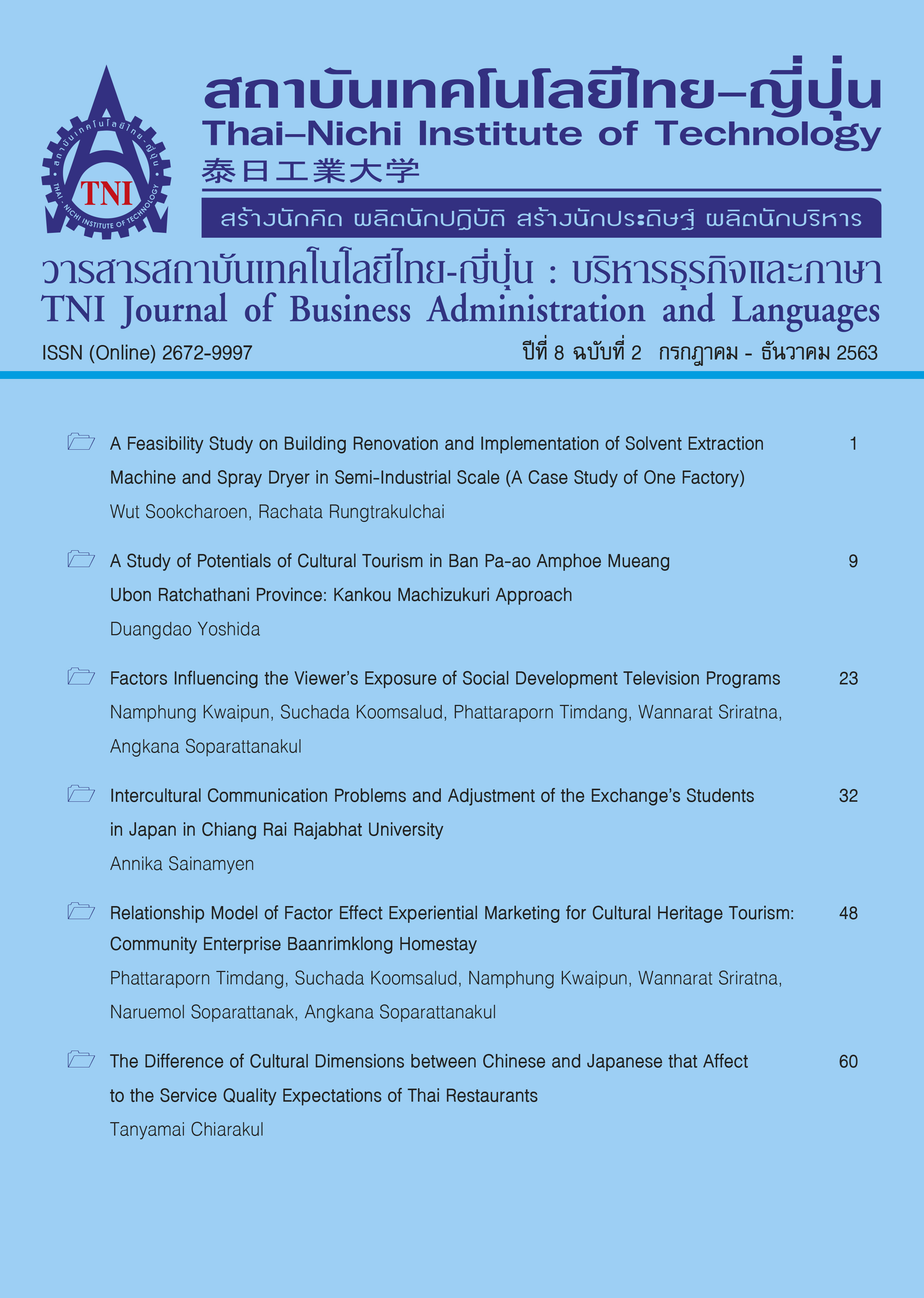A Feasibility Study on Building Renovation and Implementation of Solvent Extraction Machine and Spray Dryer in Semi-Industrial Scale (A Case Study of One Factory)
Main Article Content
Abstract
The aim of this study is to analyze the feasibility of Building Renovation and Implementation of Solvent Extraction Machine and Spray Dryer in Semi-Industrial Scale. The results of the study are determined for decision making process. The results indicated that the projected revenue would be 2,712,000 baht in the first year which would be from solvent extraction service 1,800,000 baht and from spray dying service 912,000 baht. The total revenue will be equal to 8,136,000 at tenth year. The profit will be equal to 59,500 baht at the first year after subtract the fixed costs, variable costs, and depreciation costs. At tenth year, the profit would reach to 2,850,900 baht. The results also showed that the base-case scenario, the pay-back period would be at 9 years and 2 months, the best-case scenario would be at 7 years and 2 months and the worse-case scenario would be at 11 years 1 month.
Article Details
Article Accepting Policy
The editorial board of Thai-Nichi Institute of Technology is pleased to receive articles from lecturers and experts in the fields of business administration, languages, engineering and technology written in Thai or English. The academic work submitted for publication must not be published in any other publication before and must not be under consideration of other journal submissions. Therefore, those interested in participating in the dissemination of work and knowledge can submit their article to the editorial board for further submission to the screening committee to consider publishing in the journal. The articles that can be published include solely research articles. Interested persons can prepare their articles by reviewing recommendations for article authors.
Copyright infringement is solely the responsibility of the author(s) of the article. Articles that have been published must be screened and reviewed for quality from qualified experts approved by the editorial board.
The text that appears within each article published in this research journal is a personal opinion of each author, nothing related to Thai-Nichi Institute of Technology, and other faculty members in the institution in any way. Responsibilities and accuracy for the content of each article are owned by each author. If there is any mistake, each author will be responsible for his/her own article(s).
The editorial board reserves the right not to bring any content, views or comments of articles in the Journal of Thai-Nichi Institute of Technology to publish before receiving permission from the authorized author(s) in writing. The published work is the copyright of the Journal of Thai-Nichi Institute of Technology.
References
Customs Department. (2014, April 21). Statistics. (in Thai). Retrieved from http://www.customs.go.th/
Department of Thai Traditional and Alternative Medicine. (2019, April 21). 5 Years Strategic Plan (2017-2021) Revision 1 (2019). (in Thai). Retrieved from http://tpd.dtam.moph.go.th/
Hfocus. (2556, April 21). Depletion of Thai Herbal. (in Thai). Retrieved from https://www.hfocus.org
Kasikorn Research Center. (2019, April 21). Best of opportunity for SME in herbal products. (in Thai). Retrieved from https://www.kasikornbank.com
Majura. J. G. (2019). Feasibility study. Indiana: Xlibris Publishing.
Porter, M. E. (2008). The five competitive forces that shape strategy. Harvard Business Review, 86(1), 78–93.
The Cosmeceutical Market-Current and Future Outlook in-Cosmetics Asia. (2013, April 21). Shushmul Maheshwari, RNCOS Business Consultancy Services, 2014 Euromonitor International, Beauty and Personal Care in Thailand, 2015. Retrieved from https://asia.in-cosmetics.com


